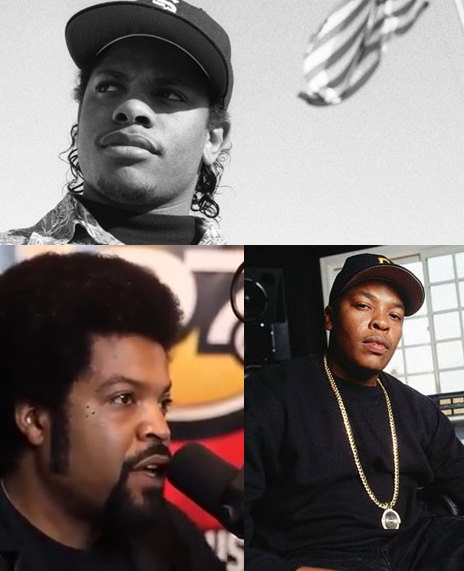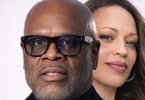What You Won’t See in Straight Outta Compton!!!
Before the feud kicked off between Eazy-E, Ice Cube and Dr. Dre The Arsenio Hall Show was the vessel for N.W.A. – but none of these’s aspect were included in F. Gary Gray’s Straight Outta Compton.
The interview takes place after Ice Cube had left the group and N.W.A. was promoting their 100 Miles and Runnin’.
CelebNMusic247.com has done our research and pulled from numerous sources to bring you information about N.W.A., Eazy-E, Dr. Dre and Ice Cube.
But before you watch the video, if you are unfamiliar who was Eazy-E and how he started Ruthless Records, then you’re gonna wanna read on.
In the movie you learn that it was Dr. Dre who approached Eric Wright, asking him to get involved in the music business. It was also explained that Eric wanted of the drug slanging biz, so it was a perfect marriage. He had the money to press the records, Dr. Dre had the talent and Ice Cube had the lyrics that would take the world by storm, but who was Eric Wright?
He was a drug dealer, a high school dropout, and a member of the Kelly Park Compton Crips, Eric Wright aspired to get involved in the music business by starting his own record label with the help of Jerry Heller, a down-on-his luck former manager to stars like Elton John and Marvin Gaye.
N.W.A’s jump from Macola Records to the upstart Priority Records where the group would record their true debut album, Straight Outta Compton.
Like it was explained in Straight Outta Compton, Eric ‘Eazy-E’Wright originally did not intend to be a rapper himself, his fluke success rapping “Boyz-n-the-Hood” (when another group on his label refused) made him officially join N.W.A for Compton.
“Eric used to say it best. He would say he was the conceptualizer, Dre was the musicalizer, Cube was the verbalizer, and Jerry was the finanicalizer.” – Jerry Heller explained.
That system worked for a while — long enough to change popular music forever, anyway. Things went well for N.W.A until financial disputes drove Ice Cube, then later Dr. Dre, away from the group, which also played out in the film as the catalist the was the roots of a new era of music and that branched off in many directions.
From Death Row Records, to Aftermath – G-Unit and Shady Records. Aftermath Entertainment houses some of hip hop’s top money-making artists like Dr. Dre, Eminem, 50 Cent, Kendrick Lamar and Jon Connor.
Now, watch the N.W.A.(N—as With Attitudes) speaking with Arsenio back in the day, making their voices heard about the US should be taking care of home first:
Continuing with the history of N.W.A., Ice Cube spoke with Hot97 to discuss leaving the group and what followed.
What Cube talks about is how Jerry Heller and Eazy-E vetoed Dr. Dre working with him and how he was able to deal with Priority Records to pursue continue his career.
Ice details how he felt about Eazy-E and how he didn’t understand the business to Rosenberg of Hot97. Cube adds how Heller was screwing them all over, while embezzling the profits of N.W.A. – Cube says that “he expecting them to keep going,” but he “didn’t expect them to diss.”
Ice Cube, born O’Shea Jackson, explains how the beef started between Eazy and himself. He reveals that he was “pissed with Eazy-E for coming at him” with the dis track “100 Miles and Runnin.”
[rpi]
The movie touches on these details, but the film doesn’t go as deep as we hoped – the video interview below details everything and more. Ice Cube (the true lyricist of N.W.A.) fills in the gaps to help you get more knowledge on one of hip-hop’s most influential and notorious groups before Puffy and Biggie made their impact and before the second most notorious rap feuds between Tupac (Death Row Records) and Biggie Smalls (Bad Boy Records).
Ruthless Records was exactly what the were, Ruthless – but the serge of labels to follow had way more meaning to their names if you pay attention to hip hop and its history.
Listen to Ice Cube as he explains why he was upset with Eazy-E & and why he decided on leaving N.W.A.:
It you listened to Cube’s interview then you understand what basically caused the divide and the feud between Ruthless Records and Lynch Mob.
While the feud was still at an all time high between Cube, Dr. Dre and Eazy-E, he went on the The Arsenio Hall Show and aired his thoughts on his former “brother” Andre Romelle Young. in the video, Eric comes out in his black boxers, shirtless with a black Night Talk robe, sitting down with Arseno to have a one-on-one conversation about N.W.A and his beef with Dr. Dre, who had left the group to start Death Row Records with the infamous Suge Knight.
What the film did not touch on is that Eazy-E basically had Dr. Dre by the balls after he signed the exclusive Ruthless Records deal with he and Jerry Heller. As Eric puts it, he makes money off everything Dre did back then, including the Chronic albums, which his estate current collects the royalty checks.
It was a deal that Eazy-E made with Jimmy Iovine and Interscope Records (It was mentioned in the film, but the details where vague).
In another rare interview with NBC, Eazy-E talks about being a gangster rapper, and speaking from a street point of view in music.
At a time when hip hop was surfacing, and America not understanding rap, which is now entitled hip-hop, Eazy explains the power of rap music and it’s influence.
Hip Hop was on the forefront and Eazy-E (The Godfather of Gangster Rap) was one of the pioneers who shaped the hip hop music scene.
Watch how Eazy breaks it down in this interview:
At that time, finding actual footage of Dr. Dre speaking on N.W.A. is rare and hard to find, but we found this footage about the long-standing feud between Dr. Dre.
Eazy-E put Dre on blast calling him a BG, a baby gangster, because he NEVER banged, smoked weed or did anything hood worthy until he teamed up with Suge Knight.
In the video, a young Dr. Dre speaks on how Eazy-E sold his soul to Heller:
However, Dre recently spoke on the film Straight Outta Compton directed by F. Gary Gray and the how he wanted it to feel as authentic as possible.
Dre reveals that they wanted to breathe life back into Eazy-E and make you feel like he is still around, which we feel Jason Mitchell, who plays Eric ‘Eazy-E’ Wright in the film is superb.
Listen to Dre speaking with Big Boi of Power 106:
In final, Dr Dre and Ice Cube speak on where would Eazy-E would be now. The former N.W.A. members weigh in on Straight on Compton and their final days speaking to Eric.
If you watch the videos you’ll notice Dre give more info on his final moments speaking with Eric Wright from a phone call, to a last face to face before his untimely passing in 1995.
Listen:
What is interesting is how gangster rap took over, shaping the music scene and the image that hip hop has continued to embody since the N.W.A. movement started back in 1988. It was infectious, it was ground-breaking, and took over America’s youth like a virus through the airwaves.
Eazy-E was the voice, Dr. Dre was the producer and Ice Cube was the lyricist the broke down walls that no rappers have been able to do on the West Coast. With the strength of their music and the infectious change that was about to come, N.W.A. attracted the snakes, but those snakes served a purpose in N.W.A.’s history. Without them, Dre’s Death Row Records empire would have NEVER empower him to become who he is today. From DRR to Aftermath which birthed G-Unit and Shady Records
In a very interesting interview with Eazy and Cube, hear how N.W.A. started the gangster rap movement and educated college students like Lady Boss used the gangster image to propel into the music scene.
Not all “hard” rapper are really hard, it smoke and mirrors (image) that makes the music work.
Listen:
After Eazy-E bid farewell at age 31 on March 26, 1995, he was able to issue one final letter to fans before he exhailed and passed on (he was hospitalized for 11 days, which the film does not detail). Instead of adding the statement Eric wrote to fans before his death, the film captured the movement that inspired Dr. Dre to wake up and leave Death Row Records and start Aftermath.
We were able to find Eazy-E’s final farewell statement:
I may not seem like a guy you would pick to preach a sermon. But I feel it is now time to testify because I do have folks who care about me hearing all kinds of stuff about what’s up.
Yeah, I was a brother on the streets of Compton doing a lot of things most people look down on — but it did pay off. Then we started rapping about real stuff that shook up the LAPD and the FBI. But we got our message across big time, and everyone in America started paying attention to the boys in the ‘hood.’ Soon our anger and hope got everyone riled up. There were great rewards for me personally, like fancy cars, gorgeous women and good living. Like real non-stop excitement.
I’m not religious, but wrong or right, that’s me. I’m not saying this because I’m looking for a soft cushion wherever I’m heading, I just feel that I’ve got thousands and thousands of young fans that have to learn about what’s real when it comes to AIDS. Like the others before me, I would like to turn my own problem into something good that will reach out to all my homeboys and their kin. Because I want to save their asses before it’s too late.
I’m not looking to blame anyone except myself. I have learned in the last week that this thing is real, and it doesn’t discriminate. It affects everyone. My girl Tomika and I have been together for four years and we recently got married. She’s good, she’s kind and a wonderful mother. We have a little boy who’s a year old. Before Tomika, I had other women. I have seven children by six different mothers. Maybe success was too good to me. I love all my kids and always took care of them. Now I’m in the biggest fight of my life, and it ain’t easy. But I want to say much love to those who have been down to me. And thanks for your support.
Just remember: It’s YOUR real time and YOUR real life.
In addition to What you didn’t see in Straight Outta Compton, Dee Barnes, who was a member of West Coast hip-hop duo Body & Soul, and she used to host the rap-centric Fox series Pump It Up!, Weighs In On Straight Outta Compton.
Dee, basically praises Eazy-E for being a straight shot caller while putting Dr Dre, Ice Cube and director F Gary Gray on blast for an assortment of allegations. The main one being that she was “Casualty of Straight Outta Compton’s Revisionist History”.
She explains who, what and why certain people didn’t make the films final cut stating that Straight Outta Compton transforms N.W.A. from the world’s most dangerous rap group to the world’s most diluted rap group. Read the FULL article HERE…
Thoughts?
What do you think?










